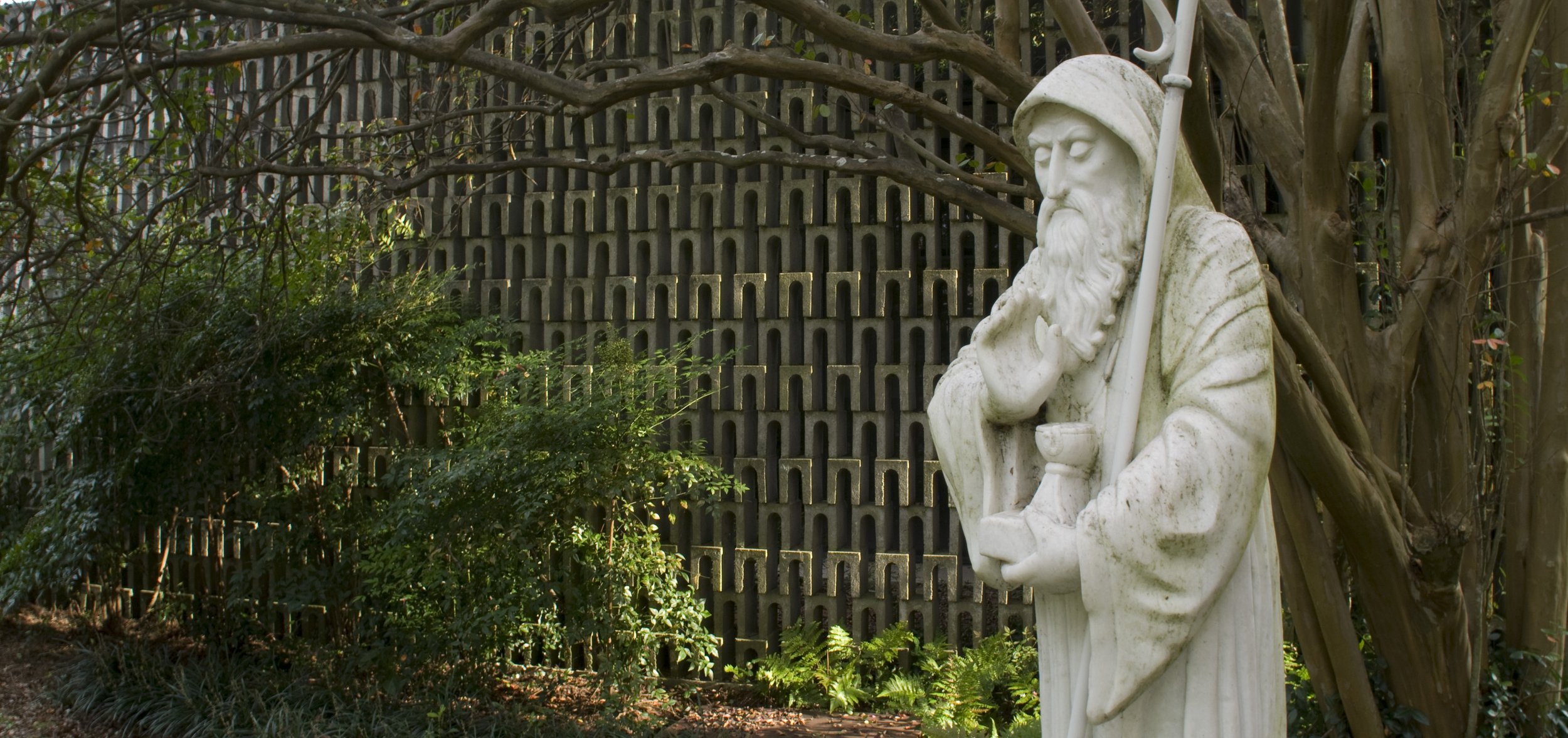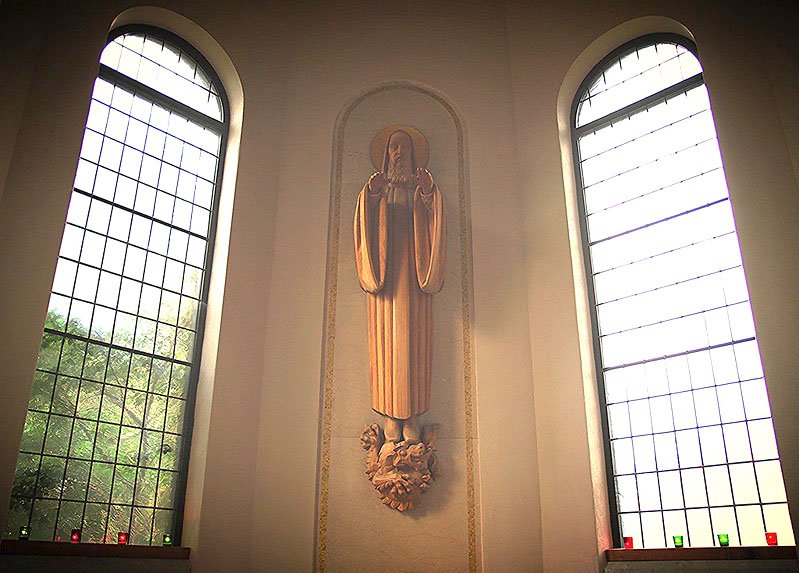
WHAT IS AN OBLATE?
“…the Lord waits for us daily to translate in action, as we should, his holy teachings.”
- Rule of Saint Benedict, Prologue 5

What Are Benedictine Oblates?
What do Saint Thomas Aquinas, Pope Benedict XVI, and Covington’s own novelist Walker Percy have in common?
Each was a Benedictine Oblate.
Benedictine Oblates are Christians who associate themselves with a Benedictine monastery in order to enrich their Christian life. Oblates shape their lives by living the wisdom of Christ as interpreted by the Rule of Saint Benedict. They seek God by striving to become holy in their own way of life. By integrating prayer and work, they show Christ’s presence in society.
Saint Paul says that each member of the body of Christ has a special function. Most are called to the married state and raising a family. Some are called to the single life in the world; others to the life of a priest or religious. The role of Oblates is to live in the world, to become holy in the world, and to bring the world to God by being witnesses of Christ by word and example.
Oblates strive to be what they are, the people of God. Their prayer life will flow from this awareness, as will their willingness to offer themselves (that is the meaning of the word oblate) for the service of God and neighbor. Oblates do not take on a set of religious practices and are not required to say certain prayers or engage in special devotions. But through their “oblation,” or gift of themselves to God, our Oblates become part of the “extended family” of Saint Joseph Abbey.
SAINT BENEDICT AND OBLATES
Saint Benedict lived in the sixth century. He was born in Nursia (today Norcia), a town north of Rome, and went to Rome for his education. Before long he abandoned his studies and lived as a hermit for a while at Subiaco, where in time he acquired a reputation for holiness. Attracting many followers, Benedict established several monastic communities, eventually moving to Monte Cassino. It was here that he wrote his Rule for Monasteries, which combined moderation with fidelity to the best traditions in Christian monasticism. During the following centuries, Saint Benedict’s Rule for Monasteries spread throughout Europe, and Benedictine monasteries became the principal centers of prayer, culture, and education.
From the beginning, Benedictine monasteries accepted children “offered” to them by their parents for religious training and education. These children lived in the community, shared its daily round of religious activities, and became known as Oblates. In the course of time, lay people asked to be associated with the work of the monks, without however leaving their homes, families, and occupations. These too offered themselves to God and were received. They became Oblates of the monastery and promised to regulate their lives according to the spirit of the Rule of Saint Benedict. They applied the teachings of the Rule to their lives in the world, in their family circles, in their places of work, and in their civic and social activities.
Throughout the world today, thousands of Oblates pray and work in spiritual union with Benedictine communities and receive strength and inspiration with their association as Oblates.
THE RULE OF SAINT BENEDICT
Oblates promise to lead a Christian life according to the gospel as reflected in the Rule of Saint Benedict. In this way they share in the spiritual benefits of the monks who are dedicated to the monastic life by vow. They spend a time of preparation as Oblate Novices. At the end of this period (called the Noviate), their formation culminates in an act of Oblation, when novices become Oblates of Saint Benedict. This promise affiliates them with a Benedictine monastery and commits them to apply to their lives the characteristic monastic principles.
Oblates strive for stability and fidelity by regular worship with other Christians and by the support they give to the apostolates of their parish as well as those of the Church as a whole.
In accord with the teaching of Saint Benedict, Oblates practice moderation. This moderation manifests itself in the use of the goods of this world, an increasing concern for their neighbor and the environment, and in the way they temper and direct their desires. Their fidelity to Christian living will provide a much needed example of genuine Christianity and a stabilizing influence for good on all around them.
In the spirit of the Gospel, Oblates commit themselves to a continual conversion to Christ. They see sin and any attachment to it as basically incompatible with a serious following of Christ. Through this deepening of their baptismal promise, Oblates are free to put on Christ and to allow Him to permeate their lives. In this way Oblates will come to recognize that in all the phases and events of their lives, in their joys and successes as well as in their sorrows and disappointments, they are in close union with Christ and participate in His very death and resurrection. This “putting on of Christ” is the goal Oblates pursue in their conversion of life.
In the spirit of obedience, Oblates strive to discover and maintain their proper relationship toward God, their family, and the civil and religious society in which they live. Before God, Oblates must come to recognize themselves as creatures dependent on their Creator and as sinners before their Redeemer. Aware of their own spiritual poverty and need of God, Oblates come to realize that they have no other reason for being except to be loved by God as Creator and Redeemer and to love and seek Him in return.
In loving obedience to God's plan, Oblates will develop a deep reverence for life. They will respect it as a precious gift from God and defend those who because of age, health, race or legal status are defenseless and most open to attack. Seeking harmony and integrity of life, they perpetuate and enhance the traditional Benedictine motto: Peace. Personally and together with other Christians, Oblates work to promote Christian family living. They take care to seek out opportunities for the practice of charity and warm hospitality to those around them.
OBLATE SPIRITUALITY
Benedictine Oblates seek God in association with a monastic community: as individuals and as members of a body, they grow in love of God, of neighbor, and of self. With the Rule as their guide, Oblates adopt values that are part of the very fabric of Christian spirituality, such as reflecting on the Scriptures; cultivating an awareness of God in silence; devoting themselves to the praise of God; and performing acts of selflessness. An acquaintance with these and other Christian values presented in the Rule of Saint Benedict will enable Oblates to attain that special peace and joy that Christ came to bring and promised to all who follow Him.

